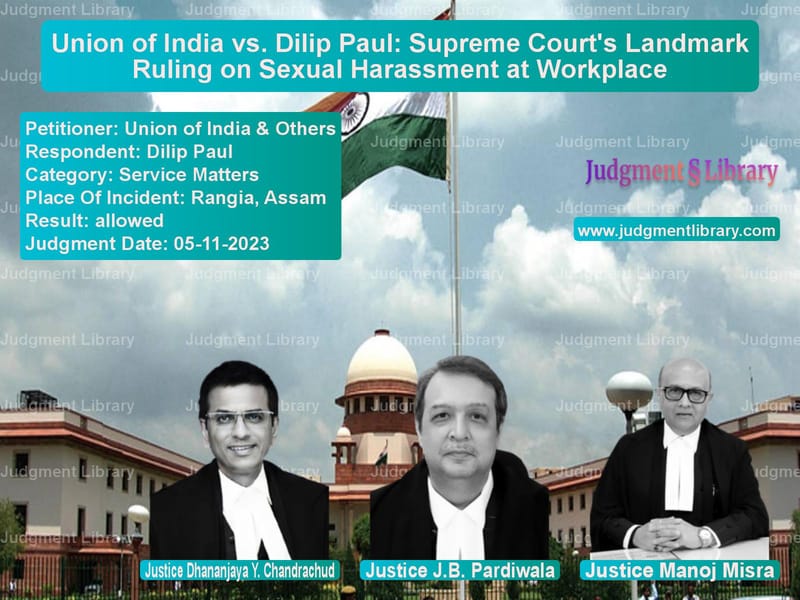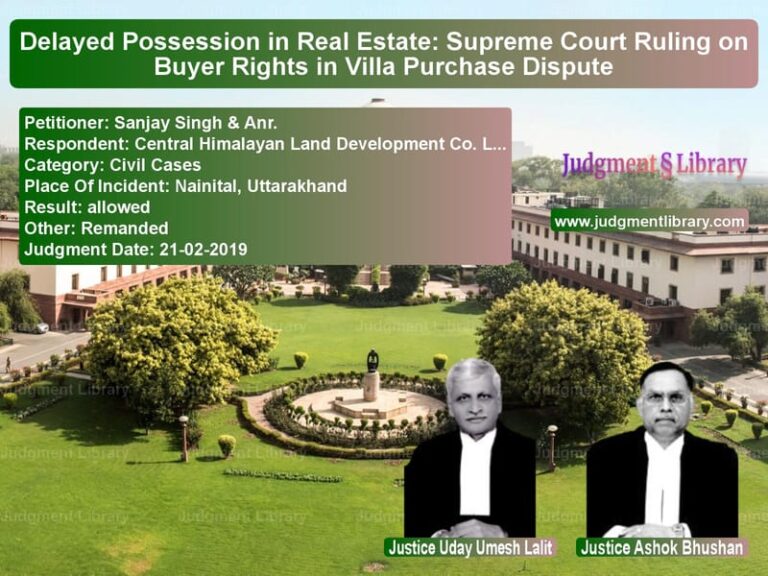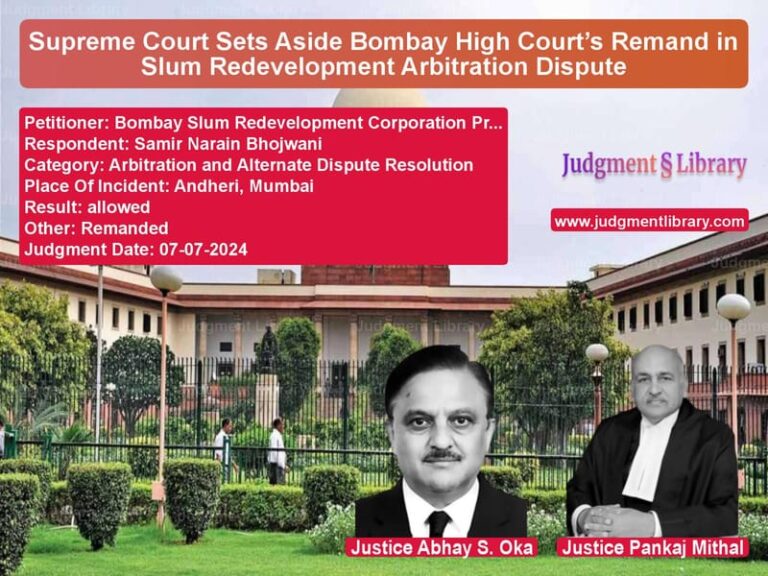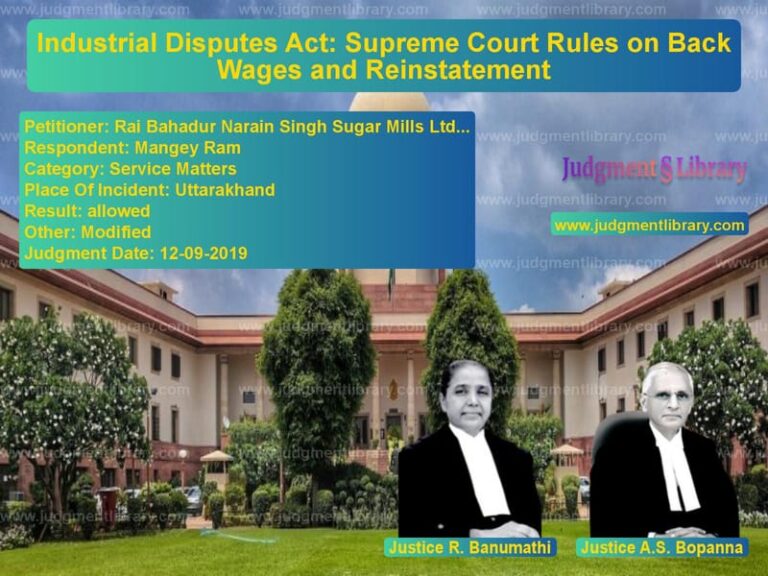Union of India vs. Dilip Paul: Supreme Court’s Landmark Ruling on Sexual Harassment at Workplace
The case of Union of India & Others vs. Dilip Paul revolves around a disciplinary action initiated against an officer of the Sashastra Seema Bal (SSB) on allegations of sexual harassment. The litigation progressed through various inquiry committees, the Central Administrative Tribunal (CAT), the Gauhati High Court, and finally reached the Supreme Court of India.
The Supreme Court meticulously examined the case to determine whether the disciplinary proceedings were conducted fairly and whether the penalty of withholding 50% of the respondent’s pension was just. This ruling is crucial in reinforcing workplace policies regarding sexual harassment and the validity of disciplinary actions under the Central Civil Services (CCS) Rules.
Background of the Case
The respondent, Dilip Paul, served as an Area Organizer at the Service Selection Board (SSB), Rangia, Assam. A female subordinate lodged a complaint on August 30, 2011, alleging that he made inappropriate advances, including unwelcome physical contact and persistent coercion for a personal relationship.
She described being harassed through indirect teasing, unwelcome visits to her residence, and phone calls at odd hours. Despite verbal warnings issued by senior officers, the harassment continued, leading the complainant to suffer from severe mental distress.
Inquiry Proceedings
Following the complaint, the matter was investigated through multiple inquiries:
- On-Spot Inquiry (2011): The preliminary report did not find substantive evidence of sexual harassment.
- Frontier Complaints Committee (2012): This committee could not fully establish the allegations.
- Central Complaints Committee (2012): The Ministry of Home Affairs constituted another inquiry committee, which found the allegations to be proved.
The Central Complaints Committee’s report led to the disciplinary authority imposing a penalty of withholding 50% of the respondent’s pension permanently.
Findings of the Supreme Court
1. The Validity of the Second Complaint
The respondent contended that the Central Complaints Committee exceeded its jurisdiction by considering a second complaint filed on September 18, 2012, which contained additional allegations. However, the Supreme Court held that the committee was well within its powers to examine all relevant complaints, provided they pertained to the same subject matter.
2. The Role of the Complaints Committee
The High Court had ruled that the committee acted improperly by putting questions to witnesses, thereby assuming the role of a prosecutor. The Supreme Court, however, clarified that inquiry authorities must be proactive in seeking the truth and are not bound by strict evidentiary norms applicable in criminal trials.
3. Standard of Proof in Disciplinary Proceedings
The Supreme Court reiterated that the standard of proof in disciplinary inquiries is preponderance of probability, not beyond reasonable doubt. The evidence presented by the complainant and corroborative witness testimonies were deemed sufficient to uphold the findings.
4. Whether the Inquiry Findings Were Based on Conjectures
The High Court had set aside the punishment, stating that some findings were based on assumptions. However, the Supreme Court emphasized that the inquiry committee’s observations were rooted in witness testimonies and the complainant’s consistent stance throughout the proceedings.
Supreme Court’s Decision
The Supreme Court overturned the High Court’s ruling and restored the penalty of withholding 50% of the respondent’s pension. It reinforced that sexual harassment cases require a sensitive yet fair approach, balancing the rights of both the complainant and the accused.
Key Takeaways
- Complaints Committees have the authority to consider all relevant allegations, even if they emerge after the initial complaint.
- Standard of proof in service law differs from criminal law; circumstantial and corroborative evidence is sufficient.
- Judicial review is limited to assessing procedural fairness, not re-evaluating evidence.
- Sexual harassment at workplaces must be dealt with strictly, with due process but without undue technical obstructions.
This judgment reinforces the framework for addressing sexual harassment complaints in government offices and ensures that disciplinary actions are based on fair yet firm principles.
Petitioner Name: Union of India & Others.Respondent Name: Dilip Paul.Judgment By: Justice Dhananjaya Y. Chandrachud, Justice J.B. Pardiwala, Justice Manoj Misra.Place Of Incident: Rangia, Assam.Judgment Date: 05-11-2023.
Don’t miss out on the full details! Download the complete judgment in PDF format below and gain valuable insights instantly!
Download Judgment: union-of-india-&-oth-vs-dilip-paul-supreme-court-of-india-judgment-dated-05-11-2023.pdf
Directly Download Judgment: Directly download this Judgment
See all petitions in Workplace Harassment
See all petitions in Disciplinary Proceedings
See all petitions in Public Sector Employees
See all petitions in Termination Cases
See all petitions in Judgment by Dhananjaya Y Chandrachud
See all petitions in Judgment by J.B. Pardiwala
See all petitions in Judgment by Manoj Misra
See all petitions in allowed
See all petitions in supreme court of India judgments November 2023
See all petitions in 2023 judgments
See all posts in Service Matters Category
See all allowed petitions in Service Matters Category
See all Dismissed petitions in Service Matters Category
See all partially allowed petitions in Service Matters Category







